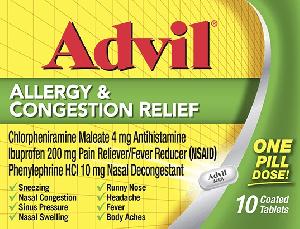Chlorpheniramine/ibuprofen/phenylephrine and Alcohol/Food Interactions
There are 2 alcohol/food/lifestyle interactions with chlorpheniramine / ibuprofen / phenylephrine.
Chlorpheniramine Food/Lifestyle
Moderate Food Interaction
Consumer information for this interaction is not currently available.
GENERALLY AVOID: Alcohol may potentiate some of the pharmacologic effects of CNS-active agents. Use in combination may result in additive central nervous system depression and/or impairment of judgment, thinking, and psychomotor skills.
MANAGEMENT: Patients receiving CNS-active agents should be warned of this interaction and advised to avoid or limit consumption of alcohol. Ambulatory patients should be counseled to avoid hazardous activities requiring complete mental alertness and motor coordination until they know how these agents affect them, and to notify their physician if they experience excessive or prolonged CNS effects that interfere with their normal activities.
Switch to professional interaction data
Ibuprofen High Blood Pressure (Hypertension)
Major Potential Hazard, Moderate plausibility
NSAIDs - fluid retention
Fluid retention and edema have been reported in association with the use of nonsteroidal anti-inflammatory drugs (NSAIDs), including some topical formulations. NSAIDs (including topicals) can lead to new onset of hypertension or worsening of preexisting hypertension, either of which can contribute to the increased incidence of cardiovascular events. NSAIDs should be used with caution in patients with preexisting fluid retention, hypertension, or history of heart failure. NSAIDs should be avoided in patients with severe heart failure unless the benefits are expected to outweigh the risk of worsening heart failure; if an NSAID is used in such patients, they should be monitored for signs of worsening heart failure. Blood pressure and cardiovascular status should be monitored closely during the initiation of NSAID treatment and throughout the course of therapy.
Switch to professional interaction data
Chlorpheniramine/ibuprofen/phenylephrine drug interactions
There are 847 drug interactions with chlorpheniramine / ibuprofen / phenylephrine.
Chlorpheniramine/ibuprofen/phenylephrine disease interactions
There are 19 disease interactions with chlorpheniramine / ibuprofen / phenylephrine which include:
- asthma
- fluid retention
- GI toxicity
- rash
- renal toxicities
- thrombosis
- cardiovascular disease
- anticholinergic effects
- asthma/COPD
- cardiovascular
- renal/liver disease
- PKU
- anemia
- hepatotoxicity
- hyperkalemia
- platelet aggregation inhibition
- BPH
- diabetes
- glaucoma
More about chlorpheniramine / ibuprofen / phenylephrine
- chlorpheniramine/ibuprofen/phenylephrine consumer information
- Check interactions
- Compare alternatives
- Reviews (1)
- Drug images
- Side effects
- Drug class: upper respiratory combinations
Related treatment guides
Drug Interaction Classification
| Highly clinically significant. Avoid combinations; the risk of the interaction outweighs the benefit. | |
| Moderately clinically significant. Usually avoid combinations; use it only under special circumstances. | |
| Minimally clinically significant. Minimize risk; assess risk and consider an alternative drug, take steps to circumvent the interaction risk and/or institute a monitoring plan. | |
| No interaction information available. |
See also:
Further information
Always consult your healthcare provider to ensure the information displayed on this page applies to your personal circumstances.


